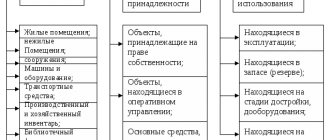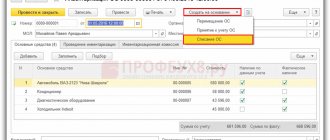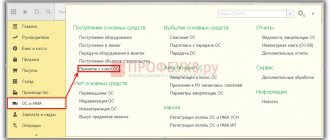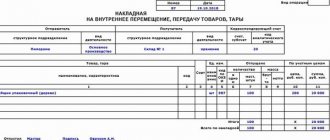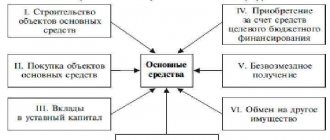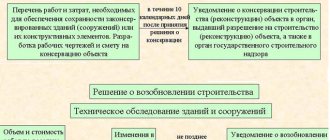Inventory, as one of the tools for monitoring the state of material assets in an organization, allows you to immediately identify their shortages. The shortage consists in less availability of material assets than is recorded in documents and accounting registers on a certain date. There may be several reasons, and the methodology for writing off missing values in accounting depends on them. The employees who have concluded the relevant contract are financially responsible for the safety of materials, goods and objects, but they do not always bear real financial responsibility when a shortage is discovered.
How to write off the shortage of fixed assets and inventories ?
How is the shortage identified?
The inventory is regulated by Order of the Ministry of Finance No. 49 dated June 13, 1995. Initially, when conducting an inventory, its results are documented in inventory lists.
Question: Based on the results of the inventory, how can we deduct the shortfall from the employee’s wages and reflect this operation in accounting? View answer
If a shortage is detected, the following documents are drawn up:
- comparison sheet;
- statement of discrepancies;
- protocol of the inventory commission;
- explanatory notes from financially responsible persons.
On a note! Comparison statements and acts have unified forms: INV-18, INV-19, TORG-2, however, organizations can also use independently developed forms enshrined in the LNA (Federal Law No. 402 of 6/12/11, Art. 9- 4).
The reasons for the shortage may be the following:
- within the limits of attrition rates;
- incompetence of responsible persons, incorrect maintenance of primary records of values;
- theft, natural disasters, other force majeure circumstances.
Question: How to reflect in the organization’s accounting the offset of the shortage of materials with surpluses due to re-grading identified during the inventory? View answer
The protocol records one of the reasons, and then the accountant reflects the shortage with postings, guided by this document.
IMPORTANT! A sample order for writing off shortages based on inventory results in the absence of culprits from ConsultantPlus is available at the link
Incompetent completion of documents and careless storage of inventory items can also lead to shortages. In this case, it is necessary to give the person in charge time and the opportunity to put the documents in order, recalculate the values and compare them with the accounting data to detect errors.
If even after these actions the missing values are not found, the organization’s material losses are attributed to the guilty person. This is an employee who signed a liability agreement and violated its terms by his actions (storekeeper, salesman, cashier).
If a case of theft is discovered, inventory materials are usually sent to the court and write-off occurs depending on its decision: to the guilty person or to the company’s costs, if this person is not identified by the court.
Accounting: write-off in the absence of culprits
If the perpetrators have not been identified or the court has refused to recover the amount of damage caused from them, write off the shortage of property to the financial results of the organization. Refer the amount of the shortfall to other expenses. A document that can confirm the absence of guilty persons can be, for example, a court acquittal, a decision to suspend a criminal case, etc. (clause 5.2 of the Methodological Instructions approved by Order of the Ministry of Finance of Russia dated June 13, 1995 No. 49). Determine the amount of loss based on the value of the missing property according to accounting data. In this case, do the wiring:
Natural loss rates
The correct application of the norms of natural loss when identifying a shortage plays an important role, since it ultimately affects the solution to the question of the source of repayment of the shortage: from the funds of the guilty parties or at the expense of the organization.
Order No. 95 of the Ministry of Economic Development dated March 31, 2003 establishes general rules for determining such standards. He characterizes natural loss as a natural loss of mass of goods and materials while maintaining their consumer properties. Such a loss must occur within the framework of documented standards. In other words, this is the permissible amount of losses during transportation and storage of valuables.
Losses from defects, technological ones, formed during storage (transportation) in conditions of violations of the rules do not count as loss of a natural nature.
In Art. 254 clause 7-2 of the Tax Code of the Russian Federation, which is used for accounting and accounting purposes simultaneously, states that the procedure for determining standards is established at the government level (post. No. 814 of 11/12/02). The resolution talks about the responsibility of various ministries and departments for the development of specific standards. There are quite a lot of such documents, and members of the inventory commission should be familiar with them: depending on the type of activity of the company, controlled values and other nuances.
Thus, the norms of losses during the transportation of alcohol are regulated by Decree of the USSR State Supply Committee dated 12/18/87 No. 153, confectionery goods during storage - by order of the Ministry of Industry and Trade dated 03/01/13 No. 252, mixed feed - by orders of the Ministry of Agriculture dated 04/06/07 No. 198 (storage), Ministry of Agriculture No. 569, Ministry of Transport No. 164 dated 11/19/07 (transportation), etc.
Persons responsible
When intending to bring to justice those responsible for the shortage of workers, you should remember:
- on the existence of a liability agreement;
- about the nature of the responsibility specified in the document (full, partial).
If an agreement was not concluded with an employee, it will be problematic to hold him accountable. Also, if the document only partially states liability, it is impossible to recover the full amount of the deficiency.
In addition to the contract, an employee may be issued a one-time document indicating his financial responsibility (for example, a power of attorney to receive goods and materials, an invoice). These features are discussed in the Labor Code of the Russian Federation, Art. 243-244.
The situation due to shortages does not fall under the cases described in Art. 243 of the Labor Code of the Russian Federation: an employee can be punished only in the amount of average monthly earnings (ibid., Art. 241, letter No. 1746-6-1 dated October 19, 2006, Rostrud).
Legal proceedings are possible if the employee does not agree to voluntarily pay the shortfall or has already quit and there is no way to recover it from earnings. The issue of recovery is also resolved through the court in cases where the employee’s position does not imply the conclusion of a liability agreement. The manager always bears full financial responsibility, regardless of the fact of concluding an agreement with him (Article 277 of the Labor Code of the Russian Federation).
Accounting: compensation for damage by the guilty party
Attribute the shortage of goods in excess of the norms of natural loss, as well as the shortage of other property, to the perpetrators. In this case, the employee must compensate the organization for the entire amount of damage caused (Article 243 of the Labor Code of the Russian Federation). Determine the amount of damage based on the market price of the missing property, but not lower than its value according to accounting data (Article 246 of the Labor Code of the Russian Federation).
If the employee reimburses only the book value of the property, make the following entries:
Debit 73 Credit 94
– the shortage of property is attributed to the employee at book value;
Debit 50 (51, 70) Credit 73
– the employee’s shortfall debt has been repaid.
If an employee compensates for damage based on the market price of the missing property, make the following entries:
Debit 73 Credit 94
– the shortage of property is attributed to the employee at book value;
Debit 73 Credit 98
– reflects the difference between the market and book value of the missing property;
Debit 50 (51, 70) Credit 73
– the employee’s shortfall debt has been repaid.
As the employee repays the amount of debt due from him, write off the difference in proportion to the share of the repaid debt:
Debit 98 Credit 91-1
– the difference between the market and book value of the missing property is included in income.
This procedure follows from paragraph 5.1 of the Methodological Instructions, approved by Order of the Ministry of Finance of Russia dated June 13, 1995 No. 49, and the Instructions for the chart of accounts.
If a shortage is identified in the reporting year, but it relates to previous reporting periods, and the culprit is identified, take it into account as part of future income. At the same time, assign the amount of the shortfall to the guilty person. In this case, make the following entries:
Debit 94 Credit 98
– reflects the shortage identified in the reporting year, but relating to previous reporting periods;
Debit 73 Credit 94
– the shortage of property is attributed to the employee.
As the employee repays the debt, make the following entries:
Debit 98 Credit 91-1
– the shortfall repaid by the employee is included in income.
Such rules follow from the Instructions for the chart of accounts.
Situation: is it possible to recover the shortfall from a dismissed employee? Was an agreement on collective financial responsibility concluded with the employee? The inventory was carried out after dismissal.
Article 232 of the Labor Code of the Russian Federation states that termination of an employment contract does not exempt an employee from compensation for damage. But in order to prove that the shortage of property arose through the fault of the employee, it was necessary to conduct an inventory upon his dismissal. After the passage of time, it is impossible to prove the guilt of the dismissed employee. This means that it is also impossible to recover the shortage.
Postings
The account directly named as related to shortages is “Shortages and losses from damage to valuables” (94), but it is not always used.
During a planned inventory, if there is a shortage, make an entry Dt 94 Kt of valuables accounts ; in case of force majeure (fires, natural disasters), it is included in profit and loss: Dt 99 Kt of valuables accounts .
If a shortage is identified when counting goods from counterparties, the Dt 94 Kt scheme for valuable accounts (within the limits of the volumes fixed by the contract). Volumes of shortages identified during the calculation that are larger than those provided for in the contract may give rise to claims. Then use the entry Dt 76 Kt of value accounts .
In account 76, a sub-account “Settlements for claims” is opened. The shortage is recorded depending on the type of goods and materials: Dt 94 Kt 01, 10, 41, 50. The detected shortage of fixed assets is recorded according to Kt 01 at the residual value, depreciation is written off separately: Dt 02 Kt 01.
Financially responsible persons are not obliged to compensate for shortfalls within the limits of natural loss. It increases the cost of production: Dt 20, 23, 44, etc. Kt 94 .
The shortfall in excess of the loss norms is repaid from the funds of the guilty employees: Dt 73/2 Kt 94. If the culprit is not found or there is a court decision in favor of the financially responsible person about his innocence, the excess shortfall is charged to other expenses of the company: Dt 91/2 Kt 94.
Briefly about the main thing
- The write-off of shortages during inventory is carried out depending on its reasons.
- The shortage within the limits of natural loss norms and compliance with the terms of the agreement between counterparties is taken into account in account 94 and written off to the cost of production. If the lack of material assets is higher than the norm, the company’s losses are compensated by the guilty employee from his own funds. If the culprit is not found or determined by the court, the shortage will be written off as other expenses.
- Shortages resulting from disasters and natural disasters are included in profit and loss (account 99), and in a situation where goods received from a counterparty have a shortage not provided for in the contract, account 76, subaccount “Settlements for claims”, is used.
- The norms of natural loss are established by separate documents of the ministries and are applied depending on the industry, business area, and inventory object by members of the inventory commission when calculating damage.
- It is very problematic to hold guilty persons accountable if a liability agreement has not been concluded with them.
- The manager always has financial responsibility to the company; such an agreement is not concluded with him.
Lack of postings: correspondence and cost (including original)
The correspondence of accounting accounts in entries for the shortage of fixed assets reflects, on the one hand, the disposal of fixed assets, and on the other hand, at the expense of whose funds this occurs. Fixed assets are depreciable property, and at the time of detection of its absence, it can be depreciated either completely or partially. Therefore, first of all, you need to determine the value of its residual value - it will be the amount of damage caused by the disappearance of the equipment.
The formation of the residual value of a retiring fixed asset is usually reflected in a separate subaccount of account 01, where the difference between the original cost and accrued depreciation is shown. That is, the shortage of the device in the postings will be reflected by writing off the original cost within account 01 (Dt 01/disposal Kt 01) and assigning to account 01 the entire amount of depreciation accrued for this fixed asset (Dt 02 Kt 01/disposal).
The result obtained after these postings on the debit of subaccount 01/disposal is subject to write-off from accounting by posting Dt 94 Kt 01/disposal. The use of account 94 in this case is mandatory, since it is precisely this correspondence in the posting that will show that the inventory revealed a shortage of fixed assets or their damage.
Further accounting entries will reflect at whose expense the amount of the shortfall will be taken into account:
- financially responsible person - Dt 73 Kt 94;
- third-party individual or legal entity - Dt 76 Kt 94;
- owner of the missing OS - Dt 91 Kt 94.
If the lost fixed asset was subject to revaluation and the amount of its revaluation is listed on account 83, then this amount should be written off by posting Dt 83 Kt 84.
